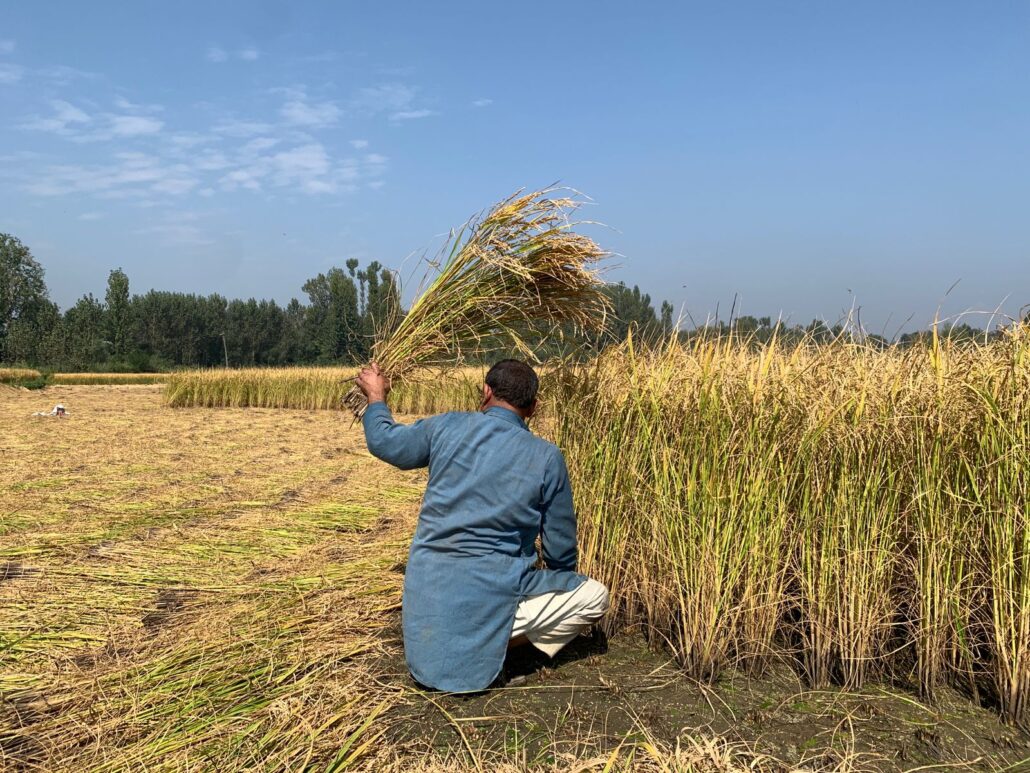
Safoora Hilal/ Suhail Dar
Ali Mohammed Dar, 51, a resident of Budgam had a small rice field before he lost it to a road widening project launched by the then Government. His fields, he says, produced sufficient rice to feed his family, but two decades after, Ali Mohammed Dar is running from one private store to the other to buy rice to feed his family.
He looks at an old mud structure, where he says, a few decades ago, his forefathers stored rice. “This traditional storage structure was used for storing food grains and it never had less than half of it filled with rice. Look at how it is now, we have to literally beg for rice,” he said.
ALSO READ: ‘Not beggars who need freebies’, say locals as food grain supplies to Kashmir are drastically reduced
As the month of Ramadhan is being observed across the Kashmir valley, the crisis over the rice allotment quota by the Central Government to the valley is visible more than ever. Locals have taken to private rice sellers as the allocated rice quantity of nearly five kilograms per person is falling short of meeting the needs of consumers.
Officials The Kashmiriyat spoke to admitted that the rice quota is not sufficient to cater to the needs of the Kashmiri families, where rice is the staple food. “We know that the allotted quota (5 KGs per person for a month) is very less than the quantity we consume. Regarding this, we have written to officials. We have sent detailed representations to higher-ups expressing the concerns of consumers, we expect some sort of relief soon,” an official of the Consumer Affairs and Public Distribution said.
The allotment issue to the Kashmir valley begun after the withdrawal of Jammu Kashmir Food Entitlement scheme in June 2018 under which five extra kilograms of rice were provided the consumers in the region. During the time of Covid 19, the Government of India introduced Pradhan Mantri Garib Kalyan Anna Yojana, however, the scheme was shut too in December 2022.
Under the Jammu Kashmir Food Entitlement Scheme (Mufti Mohammed Sayeed Food Entitlement Scheme or JKFES) five (5) kilograms of rice and five more under Pradhan Mantri Garib Kalyan Anna Yojana (PMGKAY)were provided per person in Kashmir in addition to the five kilograms provided under the National Food Security Act (NFSA).
The total allocation of food grains (rice and wheat) for the Kashmir division in July 2020 under the three schemes — NFSA, JKFES, and PMGKAY — was 585671. quintals. In August 2021, this allocation dropped down to 510000 quintals.
The closure of the Jammu Kashmir Food Entitlement Scheme (JKFES) in September 2022 reduced food grain allocation to 455000 quintals. In December 2022, Government withdrew the Pradhan Mantri Garib Kalyan Anna Yojana and the allocation of food grains to the Kashmir valley in January 2023 dropped to 283051 quintals.
Official documents accessed by The Kashmiriyat reveal that the rice allotment quota for the month of April 2023 has been further reduced to 2,43, 978. 33 quintals for Kashmiris falling in AAY, PHH and NPHH categories.
The Indian government announced in December 2022 that under the NFSA, rations would be provided free of charge for one year beginning January 1, 2023 to cushion the poor from the effects of the PMGKAY closure, which ended on December 31, 2022; however, the decision of “free distribution” has failed to amuse people in Kashmir, where the quantity has become the primary concern.
Ali Mohammed says that the Government is providing free rice, however, nobody in Kashmir wants free rice. “We are not begging for any help from the Government, but demanding that our requirements should be met. If the Government cannot, they should return me my rice field that was taken away from me for road widening some two decades back,” he told The Kashmiriyat.
He said that Kashmiris will buy rice at standard prices. Due to the decline in local rice production, Kashmir has become heavily reliant on government-supplied food grains.
Panchs and Sarpanchs of the Baramulla district held a press conference a few days ago stating that the biggest crisis in the Kashmir valley is the rice allotment quota. “The crisis seem to be growing with every day,” the PRIs association Baramulla said.
“The population of Kashmir is 60 Lakh and about 5 Lakh 85 quintals of rice was allotted by the Central Government from to Jammu and Kashmir which means that one person was granted around 10kg of rice per month, but the additional quota of rice to the valley made the average consumption to over 15 kilograms a month per person.
Kashmiris are facing immense hardships and they are coming to their public representatives as Panch and Sarpanchs to get their issues addressed, they said, adding, “We do not know who to go to to find solutions to their problems.”
They said that the due to this closure and deactivation of the schemes, the poor and common Kashmir are suffering.
They appealed the Lieutenant governor to activate the JKFES scheme so that every person may get a sufficient amount of rice. “During the month of Ramadan, people should not suffer for the want of rice or run from one private store to the other where they get rice at exorbitant rates,” they appealed.




